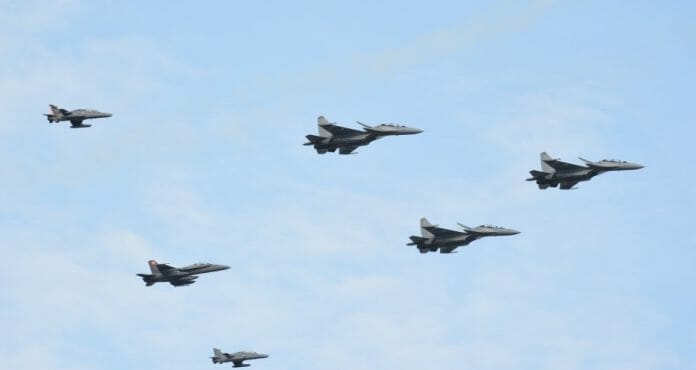Based on news reports in 2013, Malaysia, it all began on Feb 11, 2013 when Malaysians were rocked by the news that broke late into the night about the eastern shores of Sabah being invaded by a group of armed men.
The group, over a hundred people, was quickly identified to be followers of the self-proclaimed Sultan of Sulu, Jamalul Kiram III. They were led by Jamalul’s brother Agbimuddin Kiram.
In that incident, the Philippines government seemed to totally leave the fate of the royal Sulu army in the hands of the Malaysian security forces.
Hailing from Pulau Simunul of Tawi-Tawi in the southern Philippines, the group first entered Malaysian waters by boat on Feb 9 and gathered in stages at Felda Sahabat 17 in Kampung Tanduo, Lahad Datu, as a means of ‘reclaiming’ part of Borneo as their ancestral land.
This forced some eighty locals to flee from 15 homes. Upon being discovered by fishermen, the Filipino rebels broke into smaller groups and entered several locations in the village, including Kampung Sungai Bakau.
On Feb 14, then Prime Minister Datuk Seri Najib Razak said the Malaysian government would negotiate with the group before ousting them from the area.
Then Inspector General of Police Tan Sri Ismail Omar said negotiations with the group were in progress to find the best solution without bloodshed.
The tussle between Malaysia and the Philippines over Sabah had been a long-standing one. The Suluks wanted Sabah to be returned to them, claiming it was seized by the British from their government.
But Malaysia had always rejected the Philippines’ territorial claim to Sabah as it deemed Sabah residents had exercised their right to self-determination when they voted to join the Malaysian federation in 1963.
The Sulu sultanate also lost its rights in the Madrid protocol of 1885 when their predecessors Spain relinquished all their claims to Sabah, giving all control to Malaysia’s predecessors, the British.
However, it was subsequently learned the Malaysian Embassy in the Philippines was issuing cheques for RM5,300 to the legal counsel of the heirs of the Sultan of Sulu in keeping with the terms of an 1887 agreement.
While Malaysia considered it an annual cession payment for the disputed state, the sultan’s descendants considered it “rent”.
The first shootout between Malaysian security forces and the small group of Filipino rebels broke out on March 1 when the latter tried to break a police blockade in Kampung Tanduo.
Najib confirmed the event had left two police commandos dead while Sabah police commissioner, Datuk Hamza Taib, confirmed that 12 of Kiram’s followers were killed.
In the early hours of March 3, 2013 a group of Filipino gunmen, believed to be less than 10, ambushed the police in a village in Semporna, Sabah. The media reported six Malaysian police officers and seven assailants were killed. It was also reported that four of the policemen had their bodies mutilated, with one beheaded.
On March 5, three F-18 and five Hawk aircraft filled the Kampung Tanduo skies in an airstrike against the Filipino rebels at dawn in an effort to flush them out. Thirteen of the Sulu gunmen were killed in the process. Codenamed Ops Daulat, the ‘mopping up’ stage also saw ground troops going door-to-door to sniff out the intruders. However, none were caught.
Kampung Tanduo was finally secured by Malaysian forces on March 11, with the bodies of 22 Sulu gunmen recovered. Despite the deaths, the Kiram family insisted its army stay put in Sabah and not surrender.
The Lahad Datu standoff reportedly saw a total of 71 deaths – 56 from the Sulu sultanate, nine from the Malaysian authorities, and six civilians.
Not only the Malaysian media had identified the assailants as followers of the self-proclaimed Sultan of Sulu, global media reports then including the Philippines media had identified them as followers of the Sultan of Sulu.
The Philippines Star in its February 23, 2013 report was very explicit in quoting the spokesman for Sultan of Sulu Jamalul Kiram III that the Sultanate of Sulu wants Malaysia to return Sabah to the control of the Philippines.
The spokesman Abraham Idjirani issued the statement as he stressed the almost 200 members of the Royal Army loyal to Kiram III will remain holed up in Lahad Datu in Sabah for as long as it would take to resolve a standoff that has lasted for almost a week then.
Even the then Philippines Defense Secretary Voltaire Gazmin said while the heirs of the Sultanate of Sulu may have a basis for reclaiming Sabah as their ancestral land, the process they are pursuing right now is wrong.
Then Foreign Affairs Secretary Albert del Rosario also said the Philippines has requested Malaysia to extend the deadline for the followers of the Kiram family to leave Lahad Datu (see Sultanate of Sulu wants Sabah returned to Philippines )
Thus, it is quite mind-boggling for Malaysian former Attorney General, Tommy Thomas to say there appeared to be no evidence linking the Sulu descendants who were receiving the annual fees from Malaysia to the intruders of Lahad Datu in 2013, and hence according to him, there are no legal grounds for Malaysia to stop the annual payment and doing so resulted in a breach of the 1878 agreement.
In fact, Thomas is doing a disservice to the country when a MalaysiaNow report on July 20 said his letter dated Sept 19, 2019, expressed regret the Malaysian government had stopped an annual payment made to the descendants of the Sulu sultanate, which once ruled parts of the Malay archipelago including present-day Sabah, appears to be the backbone of an arbitration decision that now threatens the forfeiture of billions in Malaysian assets abroad.
After expressing regret, Thomas in his letter listed the outstanding payments including 10% interest, before arriving at the grand total of RM48,230, a sum he offered to wire “immediately” to the claimants in exchange for an end to any arbitration.
“Malaysia is now ready and willing to pay your clients all arrears from 2013 to 2019,” he wrote, adding that the offer should be reciprocated with the claimants ceasing the arbitration move.
According to the news portal, a study of the 297-point arbitration decision shows at least a dozen mentions or citations from Thomas’ letter, as Spanish arbitrator Gonzalo Stampa sought to justify the unusual award to the claimants.
The arbitration process ended with Malaysia being told to pay the group US$14.9 billion (RM60 billion) – the world’s second biggest award of the kind that eclipses the massive losses suffered by Malaysia in the 1MDB scandal.
In putting forward their case in the arbitration proceedings, the Sulu claimants several times seized upon the concession offered by Thomas, on which Stampa had relied in justifying the multi-billion dollar award.
Stampa said Malaysia had breached the 1878 agreement when it ceased the RM5,300 annual payments in 2013. “Clearly (and correctly), Malaysia’s attorney-general never perceived this arbitration as in any respect an assault on Malaysia’s sovereign prerogatives,” Stampa added.
He then crucially relied on another statement by Thomas in concluding the Sulu sultan had never divested himself of sovereignty over the territories of North Borneo.
Stampa then went on to say Malaysia had agreed the “assessment of the evidence available at the present arbitration sustains that the sultan was never deprived or divested of sovereignty over the territories of North Borneo, mentioned in both the 1878 Agreement and the 1903 Confirmatory Deed”.
He also relied on the fact that no reservation was made by Thomas that the arbitration proceedings would breach Malaysia’s sovereign immunity.
Another blow to Malaysia’s case was the wording of Thomas’ letter, which led to the conclusion that it was a commercial transaction and subject to arbitration.
by Jamari Mohtar is the Editor of Let’s Talk!, an e-newsletter on current affair.
The article is of the author’s personal opinion and does not necessarily reflect BusinessToday’s viewpoint.









